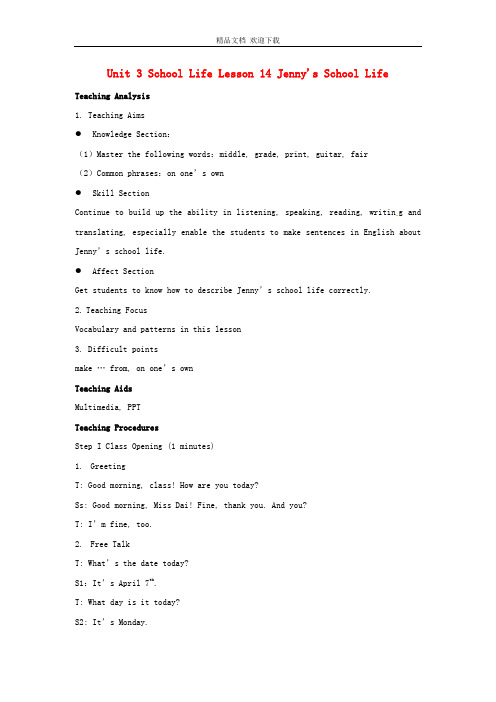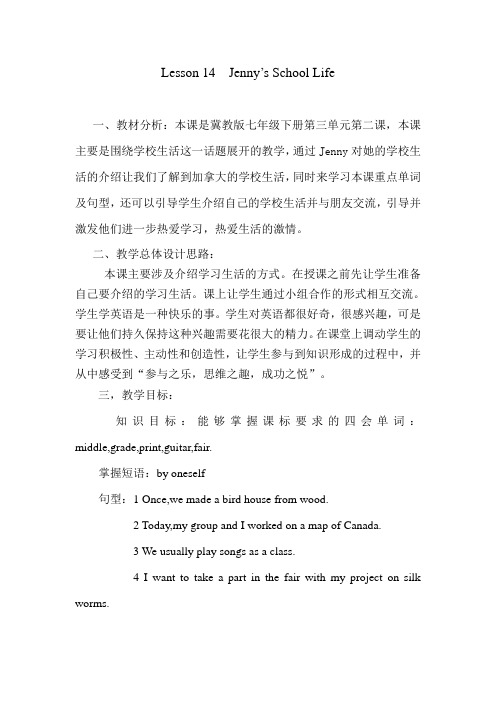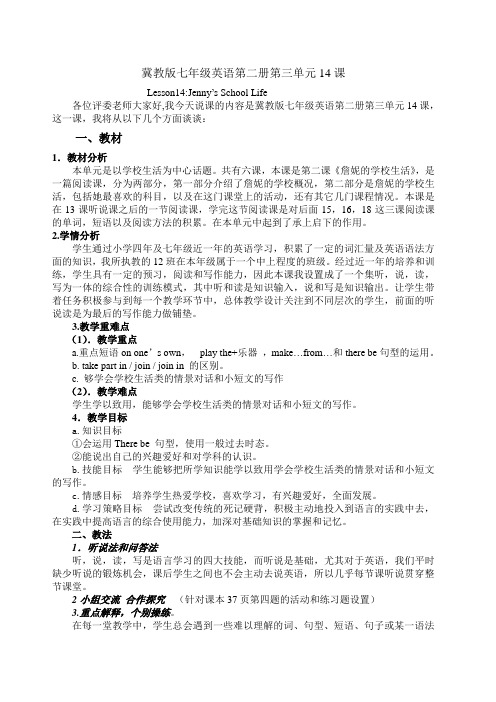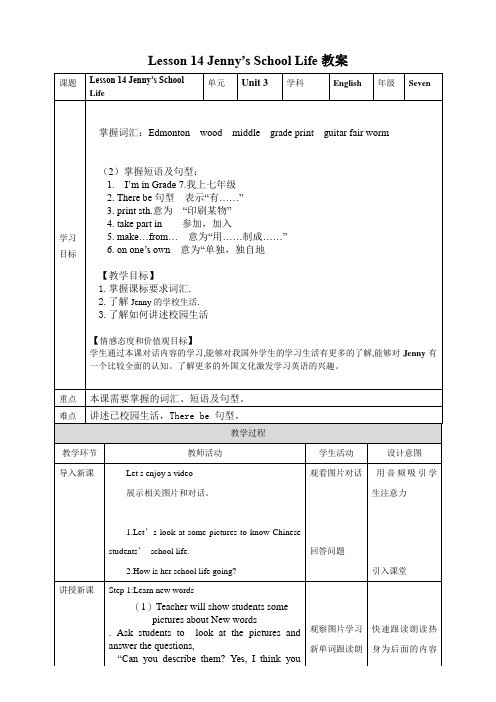七下_Lesson14_Jenny's_School_Life
初中英语(冀教版)七年级下册(七下)-《Lesson 14 Jenny's School Life》word教案 (1).doc

Unit 3 School Life Lesson 14 Jenny's School Life Teaching Analysis1. Teaching Aims●Knowledge Section:(1)Master the following words:middle, grade, print, guitar, fair(2)Common phrases:on one’s own●Skill SectionContinue to build up the ability in listening, speaking, reading, writin g and translating, especially enable the students to make sentences in English about Jenny’s school life.●Affect SectionGet students to know how to describe Jenny’s school life correctly.2.Teaching FocusVocabulary and patterns in this lesson3. Difficult pointsmake … from, on one’s ownTeaching AidsMultimedia, PPTTeaching ProceduresStep I Class Opening (1 minutes)1. GreetingT: Good morning, class! How are you today?Ss: Good morning, Miss Dai! Fine, thank you. And you?T: I’m f ine, too.2. Free TalkT: What’s the date today?S1:It’s April 7th.T: What day is it today?S2: It’s Monday.T: Look out of the window. What’s the weather like today?S3: It’s sunny.[设计思路:使用亲切、贴近生活的问候语言拉近师生关系,带学生自然进入英语氛围。
冀教初中英语七下《Lesson 14 Jenny's School Life》PPT课件

Homework
你最喜欢什么课?课上你们经常做什么?写出来和 大家分享一下吧。
The world is but a little place, after all. 海内存知己,天涯若比邻。
Practice
翻译下列句子,每空一词 1. 他喜欢制作东西。
He likes _m_a_k_i_n_g_ _th_i_n_g_s_. 2. 你会弹吉他吗?
Can you _p_l_a_y_ __t_h_e__ _g_u_i_ta_r_? 3. 上周你做什么了?
What _d_i_d__ you do __la_s_t_ _w_e_e_k__?
2. We usually play songs as a class. But sometimes we play on our own. 我们通常全班一起播放歌曲。但有时我们播放自己的。
usually, sometimes表示频率,叫做频率副词。usually表 示“通常”,sometimes表示“有时”。一般放在be动词 后、实义动词前,sometimes也可放在句首、句中或句末。 She is usually late for work. 她上班通常会迟到。 Sometimes she writes to me. 她有时候给我写信。
Language Points
1. I’m in Grade 7. 我上七年级。 表示年级和班级时,grade和class的首 字母都要大写,数字的首字母也要大写。如果同时提到 班级和年级,要把班级放在前面。 This term, Wang Mei is in Class Three, Grade Eight. 这个学期,王梅上八年级三班。
Lesson 14 Jenny’s School Life
冀教版初中英语七下U3Lesson14Jenny’sSchoolLife教学设计

3.教师通过PPT展示与本课相关的词汇和句型,如“schedule”、“homework”、“favorite”等,让学生先预习一下,为接下来的学习打下基础。
(二)讲授新知,500字
1.教师通过PPT和实物,为学生讲解本课的新词汇和句型,结合实际情境,让学生更好地理解和记忆。
5.课后巩固:
a.布置与课堂内容相关的作业,巩固所学知识。
b.鼓励学生利用课后时间,进行自主学习,培养良好的学习习惯。
四、教学内容与过程
(一)导入新课,500字
1.教师以与学生互动的方式,询问他们关于学校生活的一些问题,如:“What do you usually do at school?”、“What’s your favorite subject?”等,引导学生谈论自己的学校生活,为新课的学习做好铺垫。
3.关注学生个体差异,实施分层教学:
a.针对不同水平的学生,设计不同难度的任务,使每位学生都能在课堂上得到锻炼和提升。
b.教师在课堂活动中,适时给予学生个别指导,帮助他们克服困难,提高学习效果。
4.课堂评价:
a.采用形成性评价,关注学生在课堂上的表现,鼓励他们积极参与,提高自信心。
b.教师应及时给予学生反馈,指导他们改进学习方法,提高学习效率。
2.教师设置一些讨论话题,如:“What’s your school schedule like?”、“What do you usually do after school?”等,引导学生在小组内进行讨论。
3.各小组展示讨论成果,教师给予评价和指导,鼓励学生大胆开口,提高口语表达能力。
冀教版英语七年级下册Unit 3:Lesson 14 Jenny‘s School life 教案设

Lesson 14 Jenny’s School Life一、教材分析:本课是冀教版七年级下册第三单元第二课,本课主要是围绕学校生活这一话题展开的教学,通过Jenny对她的学校生活的介绍让我们了解到加拿大的学校生活,同时来学习本课重点单词及句型,还可以引导学生介绍自己的学校生活并与朋友交流,引导并激发他们进一步热爱学习,热爱生活的激情。
二、教学总体设计思路:本课主要涉及介绍学习生活的方式。
在授课之前先让学生准备自己要介绍的学习生活。
课上让学生通过小组合作的形式相互交流。
学生学英语是一种快乐的事。
学生对英语都很好奇,很感兴趣,可是要让他们持久保持这种兴趣需要花很大的精力。
在课堂上调动学生的学习积极性、主动性和创造性,让学生参与到知识形成的过程中,并从中感受到“参与之乐,思维之趣,成功之悦”。
三,教学目标:知识目标:能够掌握课标要求的四会单词:middle,grade,print,guitar,fair.掌握短语:by oneself句型:1 Once,we made a bird house from wood.2 Today,my group and I worked on a map of Canada.3 We usually play songs as a class.4 I want to take a part in the fair with my project on silk worms.能力目标:通过学习,提高口语表达能力和在生活中运用语言的能力。
情感目标:激发学生学习兴趣,让学生了解如何讲述自己的学习生活。
四、教学重点难点:教学重点:1、掌握单词: middle, grade, print, guitar, fair.2、掌握短语:by oneself句型:1 Once, we made a bird house from wood.2 Today, my group and I worked on a map of Canada.3 We usually play songs as a class.4 I want to take a part in the fair with my project on silk worms.教学难点:讲述自己的学习生活。
冀教版英语七年级下册Unit 3:Lesson 14 Jenny‘s School life.说课讲

冀教版七年级英语第二册第三单元14课Lesson14:Jenny’s School Life各位评委老师大家好,我今天说课的内容是冀教版七年级英语第二册第三单元14课,这一课,我将从以下几个方面谈谈:一、教材1.教材分析本单元是以学校生活为中心话题。
共有六课,本课是第二课《詹妮的学校生活》,是一篇阅读课,分为两部分,第一部分介绍了詹妮的学校概况,第二部分是詹妮的学校生活,包括她最喜欢的科目,以及在这门课堂上的活动,还有其它几门课程情况。
本课是在13课听说课之后的一节阅读课,学完这节阅读课是对后面15,16,18这三课阅读课的单词,短语以及阅读方法的积累。
在本单元中起到了承上启下的作用。
2.学情分析学生通过小学四年及七年级近一年的英语学习,积累了一定的词汇量及英语语法方面的知识,我所执教的12班在本年级属于一个中上程度的班级。
经过近一年的培养和训练,学生具有一定的预习,阅读和写作能力,因此本课我设置成了一个集听,说,读,写为一体的综合性的训练模式,其中听和读是知识输入,说和写是知识输出。
让学生带着任务积极参与到每一个教学环节中,总体教学设计关注到不同层次的学生,前面的听说读是为最后的写作能力做铺垫。
3.教学重难点(1).教学重点a.重点短语on one’s own,play the+乐器,make…from…和there be句型的运用。
b. take part in / join / join in 的区别。
c. 够学会学校生活类的情景对话和小短文的写作(2).教学难点学生学以致用,能够学会学校生活类的情景对话和小短文的写作。
4.教学目标a.知识目标①会运用There be 句型,使用一般过去时态。
②能说出自己的兴趣爱好和对学科的认识。
b.技能目标学生能够把所学知识能学以致用学会学校生活类的情景对话和小短文的写作。
c.情感目标培养学生热爱学校,喜欢学习,有兴趣爱好,全面发展。
d.学习策略目标尝试改变传统的死记硬背,积极主动地投入到语言的实践中去,在实践中提高语言的综合使用能力,加深对基础知识的掌握和记忆。
冀教版英语七年级下册 Unit 3 Lesson 14《Jenny’s School Life》课件(共28张PPT)

4. But sometimes we play on our own. Excises: We should do our homework on our own. (同义句) by We should do our homework ____ ourselves _____________. 翻译:他拥有他自己的车。
No, they don’t.
5. Sometimes we make things with clay.(翻译句子) 有时候我们用黏土制作东西。 ___________________
Read the text and find out the important phases
1)我的班主任 my homeroom teacher in shop class 2)在手工课上 3)用木头制作鸟舍 make a bird house with wood 4) 用粘土制作东西 make things with clay 5) 小组合作 work in groups work on 6)从事 7)在第一学期 in the first term play the guitar 8)弹吉他 have art class 9)上美术课 on one’s own 10)单独 11)举办一个科学展览会 have a science fair take part in 12)参加
He owns his own car.
5. We always draw and paint. Sometimes we work in groups.
① 频率副词
always >usually>often> sometimes >never 总是 通常 经常 有时候 从不 100% 70% 60% 30% 0%
Lesson+14+Jenny’s+School+Life 冀教版七年级下册

本题采用语法判定法。由答语中“in ten minutes” 可知此句为一般将来时态,There be 句型的一般 将来时为There will be…/There is going to be …, 排除A、C、D。
Language Points
4. Once, we made a bird house from wood. 曾经,我们用木头制作了一个鸟舍。 make…from…意为“用……制成……” ( 不能从成品中看出原料)
the desk.
A. are
B. is
C. have
【解析】 本题采用分析句子结构法。There be 句型本身就 表示“有……”,所以用be动词而不用have。又因 There be 句型中be动词的单复数取决于离be动词 最近的名词(就近原则),a ticket 为单数,故be动 词用is。
Practice
学习重点:
1. There is /are +某物+某地 2. make…from…/ make…with… 3. on one’s own, take part in
Lead in
(1) What do you think of your school life? (2) What school life do you like better? (3) Do you know school life in western countries?
Language ②对这些频度副词进行提问时,要用 how often。 Points 如:Sometimes, Jenny plays computer games.
(对画线部分提问)
→How often does Jnny play computer games?
冀教版英语七年级下册 Lesson 14 Jenny's School Life教案

2. There be句型表示“有……”
3. print sth.意为“印刷某物”
4. take part in参加,加入
5. make…from…意为“用……制成……”
6. on one’s own意为“单独,独自地
【教学目标】
1.掌握课标要求词汇.
2.了解Jenny的学校生活.
Step 8:Practice
根据提示填写单词。
完成下列习题
观察图片学习新单词跟读朗读新单词
Listen to Part 1 and number the words.
Listen to the
teacher
carefully and
take notes.
做游戏增加课堂趣味
Work in pairs
引入课堂
讲授新课
Step 1:Learn new words
(1)Teacher will show students some picturesabout New words
. Ask students to look at the pictures and answer the questions,
3.了解如何讲述校园生活
【情感态度和价值观目标】
学生通过本课对话内容的学习,能够对我国外学生的学习生活有更多的了解,能够对Jenny有一个比较全面的认知。了解更多的外国文化激发学习英语的兴趣。
重点
本课需要掌握的词汇、短语及句型。
难点
讲述已校园生活,There be 句型。
教学过程
教学环节
教师活动
学生活动
2.()Li Ming is from______________.
- 1、下载文档前请自行甄别文档内容的完整性,平台不提供额外的编辑、内容补充、找答案等附加服务。
- 2、"仅部分预览"的文档,不可在线预览部分如存在完整性等问题,可反馈申请退款(可完整预览的文档不适用该条件!)。
- 3、如文档侵犯您的权益,请联系客服反馈,我们会尽快为您处理(人工客服工作时间:9:00-18:30)。
Time
8:309:20 9:3010:20 10:4511:35 12:3013:20
Monday
English English PE Math
After school clubs
Science
French
After school clubs
After school clubs
读课文,回答下列问题
1. What is the name of Jenny’s school ? Her school is Greenwood Middle School. 2. What grade is Jenny in? She is in Grade 7. 3. How many students are there in Jenny’s school? There are 400 students in her school. 4. What does she often do in shop class? They often make many different things.
Jenny’s Tuesday Wednesday Timetable
Social Studies Social Studies Math Shop English English PE Math
Thurቤተ መጻሕፍቲ ባይዱday
Social Studies Social Studies Math Science
Friday
5. In music class, do the students always play songs as a class?
No, they don’t. They usually play songs as a class. But sometimes they play on their own.
短语练习 Fill in the blanks: 1.她在格林伍德中学上学。
Greenwood Middle School . she studies in _________________________
2.我们学校有一千名学生。
There are one thousand students in our school ________ ___________.
Lesson 14 Jenny’s School Life
导入:复习提问上节课的单词短语
新授 读课文单词
printed shirt
wood
silk worm
guitar
play the guitar
make …with
An Art Class shop 手工艺课
单词练习 Fill in the blanks: middle grade wood print guitar fair 1.She is standing in the middle ______ of the room. Grade 2.I’m in Class 1, _____ 6 . fair . 3.We will have a science _____ 4.He is playing the guitar _____ . print my own T-shirt. 5.I want to ______ 6.This wooden house is made of wood _____ .
English English PE Math
13:3014:20
14:3015:20 15:3016:30
Science
Computers
Shop
French
After school clubs
Science
Computers
After school clubs
Music/Art
Music/Art
读课文,翻译下列短语
on one's own 1、单独 _____ middle school 2、中学 _________ work on 3、从事于 ________ 4、play the guitar __________ 弹吉他 5、take part in _________ 参加 6 work in group _________ 分小组 7 cut down ____________ 剪掉
“sometimes” 意为 “有时” 频度副词
通常位于be动词、助动词等之后,行为动 词之前;但有的频度副词也可位于句首或 句尾。 Sometimes, Jenny plays computer games. (对划线部分提问) How often does Jenny play computer games?
频率副词 always>usually>often>sometimes>never ★★★★★★★ always 总是 一直 ★★★★★★★ usually 通常 often 经常 ★★★★★★★ sometimes有时 ★★★★★★★ never从不 决不 ★★★★★★★
on one’s own的用法: on one’s own意为“单独;独自”,相 当于alone或by oneself。 She lives in Beijing on her own Don't go there ____ your own .It's not safe A with B on C for D at
3.There are 400 students in my school.我校有400名学生。 there be 句型,表示某地有某人或某物。 Be 动词的形式根据其后的名词来确定,当 名词为不可数名词或单数名词时,be 动词 用is 或was .当名词为可数名词复数时, be动词用are 或were . Eg.There ___(be)a bird in the tree. There ____(be) a book and some pens in the bag .
3.我们用木头做了一个鸟屋。
We make ____ a bird house _____ from wood.
4.有时我们自己弹琴。
on our own/by ourselves . Sometimes ,we play ______________________ __________
5.我想用我的蚕参加这个展览。
.My school is Greenwood Middle School. 我的学校是格林伍德中学。 in the middle 意为“在中间”,in the middle of……“在….中间” Eg.Jim sits in the middle of the classroom. 吉姆坐在教室中间。
6. Why does Jenny want to take part in the school fair this year? Because she wants to take part in the fair with her project on silk warms.
课文知识点解析 ◆But sometimes we play on our own. 但 是有时我们自己玩。
once ,we made a bird house from wood 一次,我们用木头做了一个鸟窝 make .....from..... 用.....做...... eg : I can make a box from paper . 翻译 :我要用布做一个洋娃娃 cloth I want to make a doll from ____ ______
Group work
Make dialogues
A: What’s your favourite subject? B: A: What do you do in that class? (always/usually/often/sometimes/never) B:
